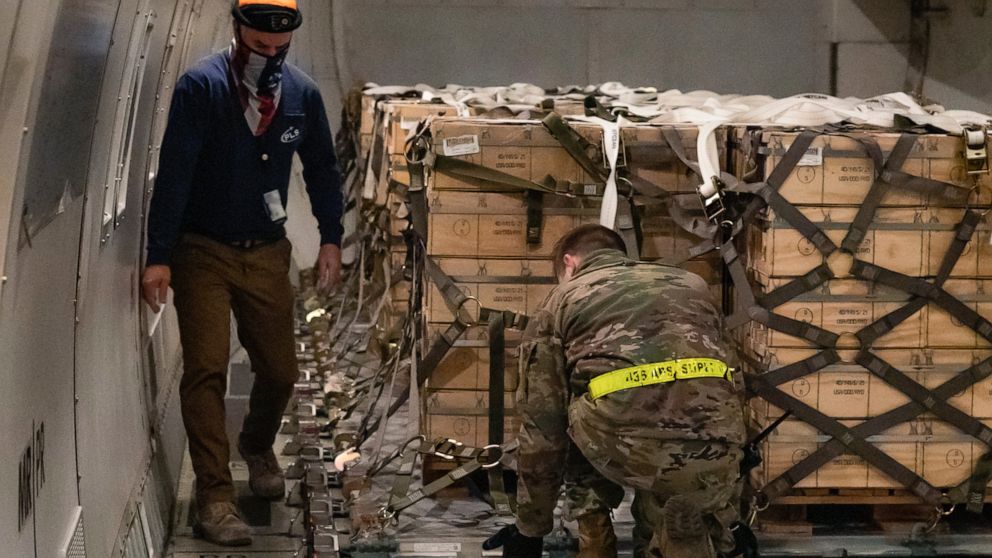NATO says Russian buildup in Belarus is biggest in 30 years
BRUSSELS — Turkish President Recep Tayyip Erdogan offered Thursday to mediate talks between Russia and Ukraine as NATO warned that Moscow’s military buildup continues, with more troops and military equipment deployed to neighboring Belarus than at any time in the last 30 years.
Erdogan, who has close but sometimes difficult ties with Russian President Vladimir Putin, said Turkey was “prepared to undertake its part in order to end the crisis between two friendly nations that are its neighbors in the Black Sea.”
“I have stressed that we would be happy to host a summit meeting at a leadership level or technical level talks,” Erdogan said after about three hours of talks with Ukrainian President Volodymyr Zelenskyy. “Instead of fueling the fire, we act with the logical aim of reducing the tensions.”
Russia has amassed more than 100,000 troops near Ukraine’s northern and eastern borders, raising concern that Moscow might invade again, as it did in 2014. The troop presence and uncertainty have unnerved Ukrainians and hurt the country’s economy. Russian officials deny that an invasion is planned.
Erdogan underlined Turkey’s commitment to Ukraine’s territorial integrity and sovereignty. Turkey and Ukraine also signed eight agreements during the meeting, including a free trade pact, according to Turkey’s state-run Anadolu Agency.
Zelenskyy welcomed Erdogan’s offer and thanked him for his “firm and consistent” support.
The crisis has put Turkey in a fix, leaving it in a position where it has to balance its growing partnership with Ukraine with its difficult relations with Moscow.
Ankara, which has historic ties to Ukraine and ethnic bonds with its Crimean Tatar community, strongly opposed Russia’s 2014 annexation of Crimea. Recently, it sold armed drones to Ukraine, which were used against pro-Russia separatists in the Donbas region, a move that angered Moscow.
At the same time, Turkey would be reluctant to joint in any sanctions against Russia. With a struggling economy, the country has pinned its hopes on tourism revenue, especially from visitors from Russia. It also relies on Russia for much of its natural gas needs.
At NATO headquarters earlier, Secretary-General Jens Stoltenberg warned that Russian troop numbers in Belarus are likely to climb to 30,000, with the backing of special forces, advanced fighter jets, Iskander short-range ballistic missiles and S-400 ground-to-air missile defense systems.
“Over the last days, we have seen a significant movement of Russian military forces into Belarus. This is the biggest Russian deployment there since the Cold War,” Stoltenberg told reporters.
Russian Defense Minister Sergei Shoigu was in Minsk on Thursday, checking on preparations for major Russia-Belarus war games scheduled for Feb. 10 to Feb. 20. Shoigu met with Belarusian President Alexander Lukashenko. Speaking about the drills, Lukashenko said the goal was “to reinforce the border with Ukraine.”
At the same time, Ukraine’s defense minister sought again to project calm, saying the probability of an invasion was “low,” and he welcomed a change by U.S. officials, who have stopped using the term “imminent” when describing the risk of a Russian attack.
Oleksii Reznikov said “the threat exists, the risks exist, but they have existed since 2014, ever since Russia has become an aggressor.” He said “there are no grounds for panic, fear, flight or the packing of bags.” The minister put the number of Russian troops near Ukraine at 115,000.
Still, Stoltenberg renewed his call for Russia to “de-escalate,” and repeated warnings from the West that “any further Russian aggression would have severe consequences and carry a heavy price.”
NATO has no intention of deploying troops to Ukraine should Russia invade, but it has begun to reinforce the defenses of nearby member countries — notably Estonia, Latvia, Lithuania and Poland. The 30-nation military alliance also plans to beef up its defenses in the Black Sea region near Bulgaria and Romania.
Stoltenberg also embraced President Joe Biden’s decision on Wednesday to send 2,000 U.S.-based troops to Poland and Germany and to shift 1,000 more from Germany to Romania, demonstrating to both allies and foes Washington’s commitment to NATO’s eastern flank.
“We are committed to finding a political solution to the crisis, but we have to be prepared for the worst,” Stoltenberg said, and he appreciated other recent offers of troops and equipment from several allies. Russia objects to the troop move and has described it as “destructive.”
In Helsinki, Finnish leaders held talks with European Commission President Ursula von der Leyen about a letter that Russian Foreign Minister Sergey Lavrov sent to several countries on the “indivisibility of security” in Europe.
Lavrov argues that the U.S. and NATO misunderstand the concept — which essentially means that the security of one European country is linked to the security of them all — and he has demanded replies from countries that signed a key security document encompassing it to clarify the issue.
Finnish Prime Minister Sanna Marin said there was no “big news” in the letter but that it warranted a reply. Von der Leyen said the commission, the EU’s executive branch, will coordinate a response, even though Lavrov insisted that only countries and not organizations should answer.
———
Fraser reported from Ankara. Associated Press writers Dasha Litvinova in Moscow, Yuras Karmanau in Kyiv, Ukraine, Jari Tanner in Helsinki and Barbara Surk in Nice, France, contributed to this report.
![]()


